Mama Wandoa Mwambu
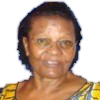
Mama Wandoa translates and distributes SFH books and films.
Working from her home in Dar es Salaam, Tanzania, Mama Wandoa Mwambu, a 74 year-old grandmother, translates STRATEGIES FOR HOPE (SFH) books and films into Tanzania’s national language, Kiswahili. But she goes much further. She also distributes thousands of copies of SFH books and films throughout the country, and to other African countries where Swahili is spoken. It all began in 2005, when Glen Williams, editor of the SFH series, asked Mama Wandoa to translate the film What can I do? into Swahili. The film tells the story of the HIV-positive Ugandan religious leader, Canon Gideon Byamugisha. For Mama Wandoa, it was just the opportunity she had been looking for: “I knew of a Ugandan church leader who had gone public about being HIV-positive, but I hadn’t met him.
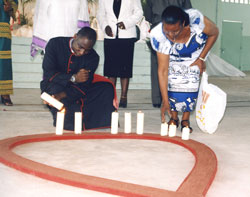 Mama Wandoa Mwambu with Canon Gideon Byamugisha at the launch of What can I do?
Mama Wandoa Mwambu with Canon Gideon Byamugisha at the launch of What can I do? “Religious communities often see HIV-positive people as sinners. For a religious leader to stand up and say ‘I’m HIV-positive’ was a real breakthrough. I remember showing the video to the HIV/AIDS Board at Muhumbili Hospital, and afterwards one of the Board members stood up and said ‘I’m HIV-positive’.” Canon Gideon came to Dar es Salaam for the launch of the Swahili version of the film, What can I do?, and spoke with many religious leaders”.
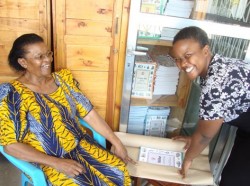 Helped by her grand-daughter Glory, Mama Wandoa packs up a parcel of CALLED TO CARE books.
Helped by her grand-daughter Glory, Mama Wandoa packs up a parcel of CALLED TO CARE books.Over 1,300 copies of the film have since been distributed in Tanzania by Mama Wandoa’s small organisation, the Upendo Centre. She believes that the film has had a big impact on religious leaders in Tanzania: “They don’t point fingers any more. They used to, but they don’t now. They see that HIV-positive people should not be stigmatised, and that we need to care for them.”
When the CALLED TO CARE workbooks began to be published, STRATEGIES FOR HOPE asked Mama Wandoa to translate them into Swahili. For Mama Wandoa, translating is a challenge: “You really have to think, but I enjoy it. It’s also a group effort. I send emails around to other people to get their opinions.” So far she has translated four:
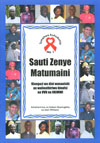
No. 1: Sauti Zenye Matumaini (Positive Voices). “People in Tanzania like this book because it’s about real religious leaders who have HIV or have cared for someone they love who has HIV. When they read the testimonies, they like them. The stories deal with stigma. I’ve seen a lot of stigma. Three of my relatives died of AIDS. But stigma reduces when religious leaders come out and say they’re HIV-positive.”
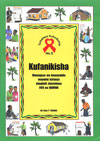
No. 2: Kufanikisha (Making it Happen). “This is a book for people who want to start a project, to know how to plan and write a project proposal. It will help people who want to start a project in their church or community. It would have helped me when I started my organisation. But it’s helping me today by helping me to see my goals clearly.”
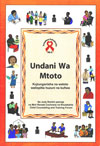
No. 6: Undani wa Mtoto (The Child Within). “This book really touched my heart. I’m particularly interested in helping children. Children grieve, but we often don’t see it. A child may have lost someone they love - maybe a parent - and we think the child is rude and badly behaved, but in fact they’re grieving. The prayer at the start of the book is so touching. It’s about how God sends us angels to help with many different things.”
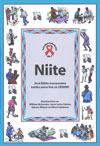
No. 7: Niite (Call to Me). “This is a very Biblical book. It’s about what the Bible says about HIV. HIV isn’t mentioned in the Bible, but blindness and leprosy are, and Jesus was touching sick people. I really like that. God teaches us not to look down on sick people. The writers of this workbook are saying that the Bible is giving us lessons that make sense today, for example, that we have to care for people living with HIV.”
 Young employees busy at work producing school kits for vulnerable children
Young employees busy at work producing school kits for vulnerable childrenTranslating and distributing STRATEGIES FOR HOPE materials is by no means Mama Wandoa’s only activity. At her Upendo Centre, Mama Wandoa also employs young people, many of them orphans, to make school kits for vulnerable school children. Upendo = ‘love’ in Swahili.
The kits include, for example, uniforms, exercise books and even mattresses. This year at least 7,000 of these kits will be produced and distributed within 10 schools in Dar es Salaam. Since the programme started in 2003 with support from a Canadian NGO, Sleeping Children Around the World, the Upendo Centre has produced and distributed over 80,000 kits to needy children in Tanzania.
Claire Williams and Olivier Paccalin




